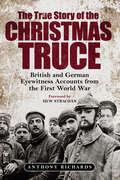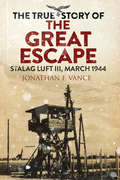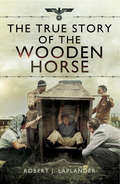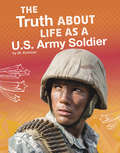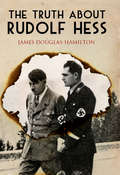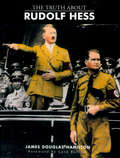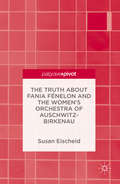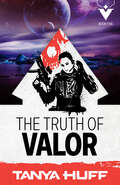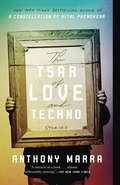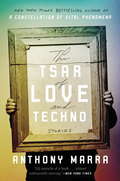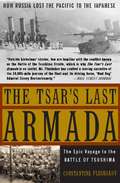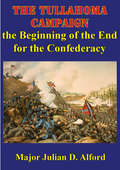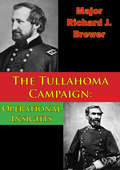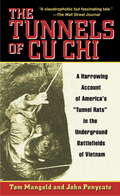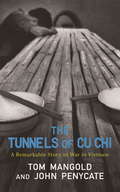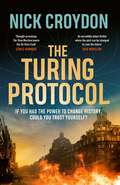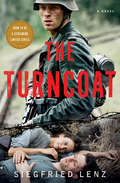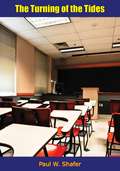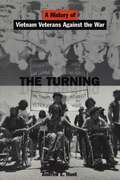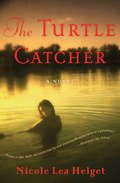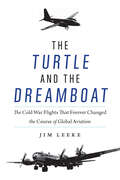- Table View
- List View
The True Story of the Christmas Truce: British and German Eyewitness Accounts from World War I
by Anthony Richards‘One of them shouted “A Merry Christmas English. We’re not shooting tonight.” . . . [then] they stuck up a light. Not to be outdone, so did we. Then up went another. So, we shoved up another. Soon the lines looked like an illuminated fete.’ Rifleman Leslie Walkington On Christmas Eve 1914, a group of German soldiers laid down their arms, lit lanterns and started to sing Christmas carols. The British troops in nearby trenches responded by singing songs of their own. The next day, men from both sides met in No Man’s Land. They shook hands, took photos and exchanged food and souvenirs. Some even played improvised football games, kicking around empty bully-beef cans and using helmets for goalposts. Both sides also saw the lull in fighting as a chance to bury the bodies of their comrades. In some parts of the front, the truce lasted a few hours. In others, it continued to the New Year. But everywhere, sooner or later, the fighting resumed. Today, the Christmas Truce is seen as a poignant symbol of hope in a war that many people regard as unnecessary and futile. But what was the real story of those remarkable few days? In this fascinating new book, historian Anthony Richards has brought together hundreds of first-hand reminiscences from those who were there – including previously unpublished German accounts – to cast fresh light on this extraordinary episode.
The True Story of the Great Escape: Stalag Luft III, March 1944
by Simon Pearson Jonathan F. VanceThe real history behind the classic war movie and the men who plotted the daring escape from a Nazi POW camp. Between dusk and dawn on the night of March 24th–25th 1944, a small army of Allied soldiers crawled through tunnels in Germany in a covert operation the likes of which the Third Reich had never seen. The prison break from Stalag Luft III in eastern Germany was the largest of its kind in the Second World War. Seventy-nine Allied soldiers and airmen made it outside the wire—but only three made it outside Nazi Germany. Fifty were executed by the Gestapo. In this book Jonathan Vance tells the incredible story that was made famous by the 1963 film The Great Escape. It is a classic tale of prisoners and their wardens in a battle of wits and wills. The brilliantly conceived escape plan is overshadowed only by the colorful, daring (and sometimes very funny) crew who executed it—literally under the noses of German guards. From the men&’s first days in Stalag Luft III and the forming of bonds among them, to the tunnel building, amazing escape, and eventual capture, Vance&’s history is a vivid, compelling look at one of the greatest &“exfiltration&” missions of all time. &“Shows the variety and depth of the men sent into harm&’s way during World War II, something emphasized by the population of Stalag Luft III. Most of the Allied POWs were flyers, with all the technical, tactical and planning skills that profession requires. Such men are independent thinkers, craving open air and wide-open spaces, which meant that an obsession with escape was almost inevitable.&” —John D. Gresham
The True Story of the Great Escape: Stalag Luft III, March 1944
by Simon Pearson Jonathan F. VanceThe real history behind the classic war movie and the men who plotted the daring escape from a Nazi POW camp. Between dusk and dawn on the night of March 24th–25th 1944, a small army of Allied soldiers crawled through tunnels in Germany in a covert operation the likes of which the Third Reich had never seen. The prison break from Stalag Luft III in eastern Germany was the largest of its kind in the Second World War. Seventy-nine Allied soldiers and airmen made it outside the wire—but only three made it outside Nazi Germany. Fifty were executed by the Gestapo. In this book Jonathan Vance tells the incredible story that was made famous by the 1963 film The Great Escape. It is a classic tale of prisoners and their wardens in a battle of wits and wills. The brilliantly conceived escape plan is overshadowed only by the colorful, daring (and sometimes very funny) crew who executed it—literally under the noses of German guards. From the men&’s first days in Stalag Luft III and the forming of bonds among them, to the tunnel building, amazing escape, and eventual capture, Vance&’s history is a vivid, compelling look at one of the greatest &“exfiltration&” missions of all time. &“Shows the variety and depth of the men sent into harm&’s way during World War II, something emphasized by the population of Stalag Luft III. Most of the Allied POWs were flyers, with all the technical, tactical and planning skills that profession requires. Such men are independent thinkers, craving open air and wide-open spaces, which meant that an obsession with escape was almost inevitable.&” —John D. Gresham
The True Story of the Wooden Horse
by Robert J. LaplanderThis in-depth historical study reveals fascinating new insight into the famous Wooden Horse escape of three Allied POWs from a Nazi prison camp.In 1943, three British prisoners of war plotted a daring and ingenious escape from Stalag Luft III by making use of a hollowed-out gymnastic vaulting horse. A year before the events of The Great Escape—which would take place at the same camp—Lieutenants Michael Codner, Eric Williams, and Oliver Philpot executed the plan that Williams later recounted in his classic memoir The Wooden Horse. Now Robert Laplander presents a revealing new account in this comprehensive study of Stalag Luft III and the many attempts at escape that occurred there during the Second World War. As Laplander explains, Williams' memoir was impeded by both a lack of necessary historical scope and regulations of the Crown. In The True Story of the Wooden Horse, Laplander makes use of newly released official documents and eye-witnesses reports. Supplemented by illustrations, including shots of a full-scale replica of the vaulting horse, this volume presents an exhaustive account of the escape in its entirety, set in the context of the camp&’s history.
The Truth About Life as a U.S. Army Soldier (The Real Scoop)
by M. KirkmanHow does someone become a U.S. army soldier? What do soldiers do? Learn about how U.S. army soldiers work, train, and more!
The Truth About Rudolf Hess
by James Douglas-HamiltonRudolf Hess' flight to Britain in May 1941 stands out as one of the most intriguing and bizarre episodes of the Second World War.In The Truth About Rudolf Hess, Lord James Douglas-Hamilton explores many of the myths which still surround the affair. He traces the developments which persuaded Hess to undertake the flight without Hitlers knowledge and shows why he chose to approach the Duke of Hamilton. In the process he throws light on the importance of Albrect Haushofer, one-time envoy to Hitler and Ribbentrop and personal advisor to Hess, who was eventually executed by the SS for his involvement in the German Resistance movement.Drawing on British War Cabinet papers and the authors unparalleled access to both the Hamilton papers and the Haushofer letters, this new and expanded edition of The Truth About Rudolf Hess takes the reader into the heart of the Third Reich, combining adventure and intrigue with a scholarly historical approach.
The Truth About Rudolf Hess
by Lord James Douglas-HamiltonRudolf Hess's flight to Britain in May 1941 stands out as one of the most intriguing and bizarre episodes of the Second World War. In The Truth About Rudolf Hess, Lord James Douglas-Hamilton explodes many of the myths which still surround the affair. He traces the developments which persuaded Hess to undertake his flight without Hitler's knowledge and show why he chose to approach the Duke of Hamilton. In the process he throws new light on the importance of Albrecht Haushofer, one-time envoy to Hitler and Ribbentrop and personal advisor to Hess, who was eventually executed by the S.S. for his involvement in the German Resistance movement. Drawing on British War Cabinet papers and the author's unparalleled access to the Hamilton archives and the Haushofer letters, The Truth About Rudolf Hess takes the reader to the heart of the Third Reich, combining adventure and intrigue with a scholarly historical approach. This remarkable book is illustrated throughout with superb photographs, placing the fascinating story in true historical perspective.
The Truth about Fania Fénelon and the Women's Orchestra of Auschwitz-Birkenau
by Susan EischeidThis book explores how the women's orchestra at Auschwitz-Birkenau has been remembered in both media and popular culture since the end of the Second World War. In particular it focuses on Fania Fenelon's memoir, Playing for Time (1976), which was subsequently adapted into a film. Since then the publication has become a cornerstone of Holocaust remembrance and scholarship. Susan Eischeid therefore investigates whether it deserves such status, and whether such material can ever be considered reliable source material for historians. Using divergent source material gathered by the author, such as interviews with the other surviving members of the orchestra, this Pivot seeks to shed light on this period of women's history, and questions how we remember the Holocaust today.
The Truth of Valor (Confederation of Valor #5)
by Tanya HuffBestselling author Tanya Huff returns to the Confederation series of military science fiction, where after centuries of fighting, the dangers of peacetime prove as alien as any new galaxy.Once Torin Kerr was a gunnery sergeant, secure in the embrace of the Confederation Marine Corps. Now the war is over. Torin is free to delve the depths of space with Craig Ryder in a tiny salvage ship, responsible only for keeping them in enough ready credit to breathe and eat. But when she discovers pirates, actual pirates, are a deadly threat to salvage operators, she can’t imagine not taking action. Even if Ryder’s motley group of colleagues and quasi-family think it’s ridiculous. After all, she doesn’t have the Marines behind her anymore.Then Ryder goes missing. Of course Torin is going after him. And whatever the odds, there will always be some who follow Torin Kerr into battle. But this time, instead of Other armies, she’s facing ruthless criminals who’ve seen her story on broadcasts. She’s fighting through all the scars and fears experience has left with her—with none of the rules that told her when to stop. And whatever happens, no one’s coming to rescue her...
The Tsar of Love and Techno
by Anthony MarraFrom the author of National Book Award longlist selection and New York Times bestseller A Constellation of Vital Phenomena come these dazzling, poignant and lyrical interwoven stories about family, sacrifice, the legacy of war and the redemptive power of art. This stunning, exquisitely written collection introduces a cast of remarkable characters whose lives intersect in ways both life-affirming and heartbreaking. A 1930s Soviet censor painstakingly corrects offending photographs, deep underneath Leningrad, bewitched by the image of a disgraced prima ballerina. A chorus of women recount their stories and those of their grandmothers, former gulag prisoners who settled their Siberian mining town. Two pairs of brothers share a fierce, protective love. Young men across the former USSR face violence at home and in the military. And great sacrifices are made in the name of an oil landscape unremarkable except for the almost incomprehensibly peaceful past it depicts. In stunning prose, with rich character portraits and a sense of history reverberating into the present, The Tsar of Love and Techno is a captivating work from one of our greatest new talents.
The Tsar of Love and Techno
by Anthony MarraFrom the New York Times bestselling author of A Constellation of Vital Phenomena--dazzling, poignant, and lyrical interwoven stories about family, sacrifice, the legacy of war, and the redemptive power of art.This stunning, exquisitely written collection introduces a cast of remarkable characters whose lives intersect in ways both life-affirming and heartbreaking. A 1930s Soviet censor painstakingly corrects offending photographs, deep underneath Leningrad, bewitched by the image of a disgraced prima ballerina. A chorus of women recount their stories and those of their grandmothers, former gulag prisoners who settled their Siberian mining town. Two pairs of brothers share a fierce, protective love. Young men across the former USSR face violence at home and in the military. And great sacrifices are made in the name of an oil landscape unremarkable except for the almost incomprehensibly peaceful past it depicts. In stunning prose, with rich character portraits and a sense of history reverberating into the present, The Tsar of Love and Techno is a captivating work from one of our greatest new talents.
The Tsar's Last Armada: The Epic Journey to the Battle Of Tsushima
by Constantine PleshakovOn May 14-15, 1905, in the Tsushima Straits near Japan, an entire Russian fleet was annihilated, its ships sunk, scattered, or captured by the Japanese. In the deciding battle of the Russo-Japanese War, the Japanese lost only three destroyers but the Russians lost twenty-two ships and thousands of sailors. It was the first modern naval battle, employing all the new technology of destruction. The old imperial navy was woefully unprepared. The defeat at Tsushima was the last and greatest of many indignities suffered by the Russian fleet, which had traveled halfway around the world to reach the battle, dogged every mile by bad luck and misadventure. Their legendary admiral, dubbed "Mad Dog," led them on an extraordinary eighteen-thousand-mile journey from the Baltic Sea, around Europe, Africa, and Asia, to the Sea of Japan. They were burdened by the Tsar's incompetent leadership and the old, slow ships that he insisted be included to bulk up the fleet. Moreover, they were under constant fear of attack, and there were no friendly ports to supply coal, food, and fresh water. The level of self-sufficiency attained by this navy was not seen again until the Second World War. The battle of Tsushima is among the top five naval battles in history, equal in scope and drama to those of Lepanto, Trafalgar, Jutland, and Midway, yet despite its importance it has been long neglected in the West. With a novelist's eye and a historian's authority, Constantine Pleshakov tells of the Russian squadron's long, difficult journey and fast, horrible defeat.
The Tulip Tearooms: A compelling saga of heartache and happiness in post-war London
by Pamela EvansTHE TULIP TEAROOMS is a heartwarming and poignant saga from Pam Evans, set in London just after the Second World War. Perfect for readers of Kitty Neale, Katie Flynn and Dilly Court.The Second World War is finally over when Lola Brown meets Harry Riggs at a dance. It is love at first sight but when Harry tells Lola that he is a policeman, her heart sinks. Lola's father is a petty criminal, and if Harry ever finds out and turns him in, it will destroy her family...Harry reluctantly accepts that Lola doesn't want to see him again, and eventually starts to find happiness without her. In the meantime, Lola encounters the eccentric Pickford sisters and sets about transforming their run-down tearooms in London's West End, only to find her own life transformed as well. Despite everything, Harry and Lola continue to feel drawn to each other, but the truth about Lola's family can't stay hidden for ever...
The Tulip Tearooms: A compelling saga of heartache and happiness in post-war London
by Pamela EvansTHE TULIP TEAROOMS is a heartwarming and poignant saga from Pam Evans, set in London just after the Second World War. Perfect for readers of Kitty Neale, Katie Flynn and Dilly Court.The Second World War is finally over when Lola Brown meets Harry Riggs at a dance. It is love at first sight but when Harry tells Lola that he is a policeman, her heart sinks. Lola's father is a petty criminal, and if Harry ever finds out and turns him in, it will destroy her family...Harry reluctantly accepts that Lola doesn't want to see him again, and eventually starts to find happiness without her. In the meantime, Lola encounters the eccentric Pickford sisters and sets about transforming their run-down tearooms in London's West End, only to find her own life transformed as well. Despite everything, Harry and Lola continue to feel drawn to each other, but the truth about Lola's family can't stay hidden for ever...
The Tulip Tearooms: A compelling saga of heartache and happiness in post-war London
by Pamela EvansTHE TULIPTEA ROOMS is a heartwarming and poignant saga from Pam Evans, set in London just after the Second World War. Perfect for readers of Kitty Neale, Katie Flynn and Dilly Court.The Second World War is finally over when Lola Brown meets Harry Riggs at a dance. It is love at first sight but when Harry tells Lola that he is a policeman, her heart sinks. Lola's father is a petty criminal, and if Harry ever finds out and turns him in, it will destroy her family...Harry reluctantly accepts that Lola doesn't want to see him again, and eventually starts to find happiness without her. In the meantime, Lola encounters the eccentric Pickford sisters and sets about transforming their run-down tearooms in London's West End, only to find her own life transformed as well. Despite everything, Harry and Lola continue to feel drawn to each other, but the truth about Lola's family can't stay hidden for ever...(P) 2022 Headline Publishing Group Ltd
The Tullahoma Campaign, The Beginning Of The End For The Confederacy
by Major Julian D. AlfordThe results of the Tullahoma Campaign had enormous effects on the outcome of the American Civil War. The Tullahoma Campaign was the beginning of the end for the Confederate cause and was a huge step in the preservation of the Union.The Tullahoma Campaign of 1863 is often overlooked and overshadowed by the simultaneous events of Gettysburg and Vicksburg. For the North, Rosecrans and his Army of the Cumberland conducted a campaign of light attacks and aggressive maneuvers that drove the Confederate Army of Tennessee completely out of the state. The results of the campaign for the Union formed the starting point for General William T. Sherman's capture of Atlanta and his subsequent march to the sea. For the South, losing the Tullahoma Campaign and the ultimate retreat from the state of Tennessee proved to be too much from which to recover. With the loss of manpower, agricultural staples, the industrial base of the region and most importantly, the Chattanooga railroad center, the Tullahoma Campaign was the beginning of the end for the Confederacy.At the beginning of the war, the Federals stated three major objectives that they needed to accomplish in order to be victorious. First, take Richmond and kill the secessionist spirit by conquering the Rebel capital. This had been attempted repeatedly but never accomplished up to this point. Second, control the Mississippi Valley and secure the western waterways. Grant had accomplished this objective by capturing Vicksburg. Finally, seize east Tennessee and hold the Nashville-Atlanta corridor, which was seen by the Federals as the major artery in the southern lifeline. Rosecrans' Army of the Cumberland had achieved most of this objective in the Tullahoma Campaign and Major General William T. Sherman would finish the objective the following summer. Winning the Tullahoma Campaign and capturing Middle Tennessee was the start of obtaining the third stated objectives.
The Tullahoma Campaign: Operational Insights
by Major Richard J. BrewerThis study examines the operational insights offered by the analysis of the Tullahoma, or Middle Tennessee, Campaign of 1863. The thesis uncovers these operational insights by examining how Major General William S. Rosecrans, commander of the Army of the Cumberland, and General Braxton Bragg, commander of the Army of Tennessee, planned for and conducted the nine day campaign.This study of both commanders planning and execution of a campaign characterized by maneuver, rather than large scale battles, highlights five important insights into operational warfighting. These insights include the translation of strategic guidance into an operational plan, offensive and defensive operational planning, the importance of deception, the effects of sustainment on an operation, and the influence of leadership on the planning and conduct of a campaign.
The Tunnels of Cu Chi: A Harrowing Account of America's Tunnel Rats in the Underground Battlefields of Vietnam
by Tom MangoldAt the height of the Vietnam conflict, a complex system of secret underground tunnels sprawled from Cu Chi Province to the edge of Saigon. In these burrows, the Viet Cong cached their weapons, tended their wounded, and prepared to strike. They had only one enemy: U.S. soldiers small and wiry enough to maneuver through the guerrillas' narrow domain. The brave souls who descended into these hellholes were known as "tunnel rats." Armed with only pistols and K-bar knives, these men inched their way through the steamy darkness where any number of horrors could be awaiting them-bullets, booby traps, a tossed grenade. Using firsthand accounts from men and women on both sides who fought and killed in these underground battles, authors Tom Mangold and John Penycate provide a gripping inside look at this fearsome combat. The Tunnels of Cu Chi is a war classic of unbearable tension and unforgettable heroes.
The Tunnels of Cu Chi: A Remarkable Story of War
by Tom Mangold John PenycateThe story of an extraordinary campaign in the Vietnam War - fought in a 200-mile labyrinth of underground tunnels and chambers.The campaign in the tunnels of Cu Chi was fought with cunning and savagery between Viet Cong guerrillas and special teams of US infantrymen called 'Tunnel Rats'. The location: the 200-mile labyrinth of underground tunnels and secret chambers that the Viet Cong had dug around Saigon.The Tunnel Rats were GIs of legendary skill and courage. Armed only with knives and pistols, they fought hand-to-hand against a cruel and ingenious enemy inside the booby-trapped blackness of the tunnels. For the Viet Cong the tunnel network became their battlefield, their barracks, their arms factories and their hospitals, as the ground above was pounded to dust by American shells and bombs.
The Turing Protocol: Discover a past you never thought possible in this gripping, high-stakes historical thriller
by Nick Croydon&‘An incredible debut&’ DON WINSLOW, New York Times bestselling author of The Cartel &‘The Time Machine meets The Da Vinci Code&’ CHRIS HAMMER, internationally bestselling author of ScrublandsHumanity's best kept secret may be its best hope for survival. In the midst of World War Two, Enigma codebreaker Alan Turing finds himself on the brink of a discovery that will change the world: a way to send a message back into the recent past. But when his invention successfully averts disaster on D-Day, the danger it poses in the wrong hands becomes terrifyingly clear. As Turing&’s enemies close in, only one decision is possible: Nautilus must be kept hidden from the world, safe in the care of the only person he can trust. Seventy-five years later, Annabelle McIntosh&’s life is upended when she learns she will become the latest custodian of the greatest secret of the modern age – Turing&’s Nautilus machine. Following in her family&’s footsteps, and bound by Turing&’s strict principles governing the use of his creation, Annabelle is soon faced with the same impossible choices. Nautilus has the power to prevent catastrophe, but the wrong decision could have devastating consequences. When the stakes are at their highest, will using the machine save the world – or destroy it? &‘A smart, gripping thriller with an amazing big idea behind it. I loved it&’ T.J. NEWMAN, internationally bestselling author of Falling &‘A fascinating alternative history with an intriguing &“what if&” at its core&’ DERVLA McTIERNAN, internationally bestselling author of What Happened to Nina? &‘A ripping tale of past-careens-into-present fiction. Urgent morse code message to my past self: READ THE TURING PROTOCOL NOW&’ TRENT DALTON, internationally bestselling author of Boy Swallows Universe
The Turncoat: A Novel
by Siegfried LenzNever has the aftermath for Germans been better depicted than in Siegfried Lenz&’s elegiac, The Turncoat. A newly discovered masterpiece.&” —Alex Kershaw, New York Times bestselling author of Avenue of SpiesPreviously unpublished, this German postwar classic is one of the best books of this major writer, who died in 2014. The last summer before the end of World War II, Walter Proska is posted to a small unit tasked with ensuring the safety of a railway line deep in the forest on the border with Ukraine and Byelorussia. In this swampy region, a handful of men—stunned by the heat, attacked by mosquitoes, and abandoned by their own troops in the face of the resistance—must also submit to the increasingly absurd and inhuman orders of their superior. Time passes, and the soldiers isolate themselves, haunted by madness and the desire for death. An encounter with a young Polish partisan, Wanda, makes Proska further doubt the validity of his oath of allegiance, and he seeks to answer the questions that obsess him: When conscience and duty clash, which is more important? Is it possible to take any action without becoming guilty in some way? And where is Wanda, this woman from the resistance he can&’t forget?Written in 1951, The Turncoat is Siegfried Lenz&’s second novel. Rejected by his publisher, who thought that the story of a German soldier defecting to the Soviet side would be unwelcome in the context of the Cold War, the manuscript was forgotten for nearly seventy years before being rediscovered after the author&’s death. A posthumous triumph.
The Turning of the Tides
by Paul W. Shafer John Howland SnowTogether with John Howland Snow, Michigan Representative Paul W. Shafer authored this 1953 exposé on the education system of the United States, which was delivered in the House of Representatives on March 21, 1952. In The Turning of the Tides, the authors take the position that the education system was an alien collectivist (socialist) philosophy, much of which came from Europe, crashed onto the shores of the American nation, bringing with it radical changes in economics, politics, and education, funded by several wealthy American families and their tax-exempt foundations.
The Turning: A History of Vietnam Veterans Against the War
by Andrew E. HuntThe anti-Vietnam War movement in the United States is perhaps best remembered for its young, counterculture student protesters. However, the Vietnam War was the first conflict in American history in which a substantial number of military personnel actively protested the war while it was in progress. In The Turning, Andrew Hunt reclaims the history of the Vietnam Veterans Against the War (VVAW), an organization that transformed the antiwar movement by placing Vietnam veterans in the forefront of the nationwide struggle to end the war. Misunderstood by both authorities and radicals alike, VVAW members were mostly young men who had served in Vietnam and returned profoundly disillusioned with the rationale for the war and with American conduct in Southeast Asia. Angry, impassioned, and uncompromisingly militant, the VVAW that Hunt chronicles in this first history of the organization posed a formidable threat to America's Vietnam policy and further contributed to the sense that the nation was under siege from within. Based on extensive interviews and in-depth primary research, including recently declassified government files, The Turning is a vivid history of the men who risked censures, stigma, even imprisonment for a cause they believed to be "an extended tour of duty."
The Turtle Catcher: A Novel
by Nicole Lea HelgetA young woman&’s secret may tear her rural Minnesota community apart, in this &“emotional tale of star-crossed love, vengeance and regret&” (Publishers Weekly). In the tumultuous days after World War I, Herman Richter returns from the front to find his only sister, Liesel, allied with Lester Sutter, the &“slow&” son of a rival clan who spends his days expertly trapping lake turtles. Liesel has sought Lester&’s friendship in the wake of her parents&’ deaths and in the shadow of her own dark secret. But what begins as yearning for a human touch quickly unwinds into a shocking, suspenseful tragedy that will haunt the rural town of New Germany, Minnesota, for generations. Woven into this &“great, rattling, breathless mystery&” (NPR&’s Weekend Edition) are the intense, illuminating experiences of German immigrants in America during the war and the terrible choices they were forced to make in service of their new country or in honor of the old. It is a vibrant, beautifully wrought look at a fascinating piece of American history—and the echoing dangers of family secrets. &“Historical fiction with a slight touch of magical realism, The Turtle Catcher is a moving portrait of difficult times and vividly realized characters&” (Booklist) from &“the most promising Minnesota writer in a generation&” (Minneapolis Star Tribune). &“One mark of a good book is that it keeps you up all night reading it. But if it&’s nearly dawn and the book is closed and you still can&’t sleep, the book&’s either brilliant or scary as hell. Nicole Helget&’s first novel, The Turtle Catcher, is both.&” —MinnPost
The Turtle and the Dreamboat: The Cold War Flights That Forever Changed the Course of Global Aviation
by Jim LeekeThe &‘Turtle&’ and the &‘Dreamboat&’ is the first detailed account of the race for long-distance flight records between the U.S. Army and U.S. Navy less than fourteen months after World War II. The flights were risky and unprecedented. Each service intended to demonstrate its offensive capabilities during the dawning nuclear age, a time when America was realigning its military structure and preparing to create a new armed service—the United States Air Force. The first week of October 1946 saw the conclusion of both record-breaking, nonstop flights by the military fliers. The first aircraft, a two-engine U.S. Navy P2V Neptune patrol plane nicknamed the Truculent Turtle, flew more than eleven thousand miles from Perth, Western Australia, to Columbus, Ohio. The Turtle carried four war-honed pilots and a young kangaroo as a passenger. The second plane, a four-engine U.S. Army B-29 Superfortress bomber dubbed the Pacusan Dreamboat, flew nearly ten thousand miles from Honolulu to Cairo via the Arctic. Although presented as a friendly rivalry, the two flights were anything but collegial. These military missions were meant to capture public opinion and establish aviation leadership within the coming Department of Defense. Both audacious flights above oceans, deserts, mountains, and icecaps helped to shape the future of worldwide commercial aviation, greatly reducing the length and costs of international routes. Jim Leeke provides an account of the remarkable and record-breaking flights that forever changed aviation.
